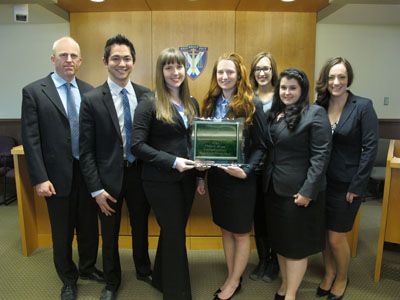
Queen’s Law students recently won the Canadian rounds of the Philip C. Jessup International Law Moot Court Competition, the largest and most competitive law moot in the world.
The Queen’s team – oralists Emily Evangelista, Stephanie Hodge, Sean Mitra and Lisa Scheulderman, and researcher Anastasia-Maria Hountalas, all Law’15, and student advisor Amélie Goudreau, Law’14 – beat out teams representing nearly every law school in Canada. Queen’s scored an impressive 6-0 sweep in every round of this extremely competitive moot that requires students to master dozens of intricate issues pertaining to current controversies in international law.
This victory continues a recent trend of impressive performances by Queen’s at the competition. Last year, Queen’s placed second in Canada, the law school’s best showing in 20 years.
“The team’s goal was to develop excellent advocacy skills, which they did. The results are simply a welcome confirmation,” says Darryl Robinson, the Queen’s Law faculty member who coached the team.
The teams were given a wide-ranging international law issue between two fictional countries, the State of Amalea and the Republic of Ritania. The two parties have gone to the International Court of Justice to resolve a number of differences that have arisen between them as a result of activities in waterway separating the two territories.
“The key to the team’s success was the variety of talent each member possesses,” says Mr. Mitra. “We all bring something different to the team and that really helped when we got to the different stages of the process from writing and researching to dealing with different issues and giving constructive criticism.”
Ms. Scheulderman says participating in the international law moot was the most valuable thing she has done in law school.
“There’s the substantive element of learning about international law, but I think the most valuable thing has been the advocacy skills,” she says. “Professor Robinson is a very experienced advocate and he taught us some very important tips and tricks for both written and oral advocacy. The one-on-one coaching is really important and it’s not something you can get in a lecture setting.”
Stephanie Hodge says attending the competitions had as much impact as the months of preparation.
“I was surprised by how much I learned just being at the competitions. By doing so many rounds, we could see what did and didn’t work and adjust accordingly. I think we all improved so much during the competitions,” she says.
The Queen’s students traveled to Washington for the international rounds of the Jessup. Participants from 550 law schools in more than 80 countries took part in the competition.
By Mark Kerr